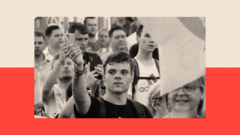In the small town of Freiberg, Saxony, a growing trend among young men is drawing attention as they express sympathy for the far-right Alternative für Deutschland (AfD) party. Nineteen-year-old Nick shares his desire for a peaceful environment resembling the one his parents enjoyed, reflecting a broader sentiment among young German men who feel threatened by rising immigration and violence attributed to asylum seekers. This trend is notable in the lead-up to Germany's national elections, where the AfD has consistently polled as a strong contender.
Research highlights a striking gender disparity in political allegiance, with around 26% of German men holding favorable views of the AfD compared to just 11% of women. The party has gained traction among the youth, particularly in the wake of anxiety stemming from societal changes and economic uncertainty. A recent study indicated these youth are predominantly concerned about immigration and maintaining conservative values, as opposed to issues centered on rights and equality.
The AfD, seen as a populist entity, has garnered attention not only through traditional rallies but also via social media platforms like TikTok. Their engagement with youthful audiences has outpaced that of traditional parties, with significant followership and a plethora of unofficial supporter accounts aiding in the dissemination of their message. Influential figures, such as TikTok influencer Celina Brychcy, promote AfD views while also navigating backlash and alienation stemming from their ideologies, which include a preference for traditional gender roles and stricter immigration controls.
Furthermore, a reaction against progressive social movements, particularly concerning gender roles and LGBTQ+ rights, has galvanized support among young men. Many express disdain for what they perceive as an exaggerated representation of gender issues, indicating a shift towards more conservative viewpoints. The ongoing normalization of such ideologies raises concerns among educators as new generations appear more susceptible to questioning historical narratives surrounding the Nazi era and accepting contemporary far-right dogmas.
As the AfD looks to solidify its position in German politics, support is appearing less as a protest and more as a genuine alignment with their platform. With the party now operational within some facets of government, observers caution that failing to counter its influence may lead to a larger shift in the European political landscape, leaving traditional parties to grapple with a resurgent far-right movement that is gaining acceptance among the youth demographic.





















